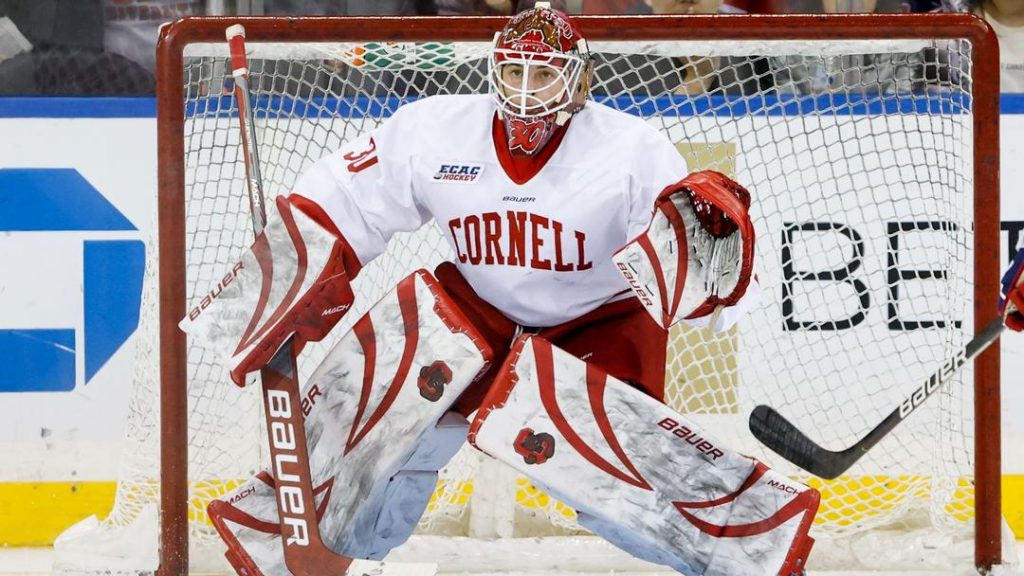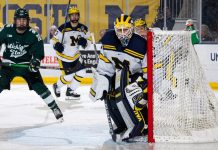
College hockey spent the last three weeks raging its way through a number of different storylines.
Top-ranked teams came and went as early season wins and losses piled up. A couple surprising outcomes raised eyebrows and drew eyeballs to potential risers and fallers. Hotshot prospects and seasoned veterans battled into corners and along the walls of arenas and rinks dotting the entire North American landscape, and the ever-present Pairwise Rankings popped into water cooler talk despite the annual reminder not to take it too seriously until after the first of the year.
Through it all, six teams sat silent. They scrimmaged teammates and walked to and from practice without a game awaiting them at the end of the week. Maybe they watched other games, just hung out and enjoyed the last few days of their fall, but after three weeks of waiting, college hockey’s family completes its circle with the first games of the Ivy League’s schedule.
“We can watch teams that have been playing for three weeks,” said Cornell coach Mike Schafer, “but that’s difficult for everyone. The coaches, the players, the fans, we’re all chomping at the bit. We know we’re behind everyone else, but those are the cards that we get dealt as Ivy League teams. We’ve simulated as much as we can, and our exhibition games were key to us seeing the pace of the game and the skill that can’t be duplicated when teams play different styles. But we know we’re going to have our hands full against a team that’s a heck of a program.
“We’re ready to be taught some lessons from a good hockey team, and we’re ready to start toughening up.”
The Ivies typically make up for their lack of runway by playing one another in their first games, and this weekend will feature customary opening weekends between travel partners like Harvard and Dartmouth or Brown and Yale. The lone holdout, Princeton, is on a bye to start this season but heads on a league weekend to Harvard and Dartmouth with travel partner Quinnipiac to kick off the November schedule with its second weekend welcoming Yale and Brown to Hobey Baker Rink.
Cornell is the lone exception, and the Big Red open this season with one of ECAC’s most critical nonconference matchups when they host Minnesota Duluth for two games at Lynah Rink. A rematch of last year’s two-game sweep by the Bulldogs, it’s one of less than a handful of series between ECAC and the NCHC, which enters this weekend having lost three games outside of St. Cloud State’s 2-4 overall record.
“You’re getting ready to see what the journey’s going to be,” Schafer said. “That’s the most exciting part. Every coach goes through it where they ask if their team is going to be any good, and they ask what adversity they might face or get caught up with because everyone wants to play well. That journey never gets old, and that first game is all the same thing. We might not know what we have until about Thanksgiving [because of the late start], but we will get there and want to see what we have by playing a good team [like UMD].”
What Cornell might have is what makes this weekend’s series so intriguing. The Big Red were 12-3-1 at home last year and haven’t lost more than four games at Lynah since a 12-6-0 season in 2018-2019. Even during that year, the team went 7-2-4 on the road and advanced to both the ECAC championship and the East Regional Final, and it’s been seven years since the team didn’t seriously challenge for a national tournament spot with less than 20 overall wins.
Comparing that to the NCHC requires little to no hype, but Minnesota Duluth is the kind of team capable of bringing its strength right into Cornell’s bread basket. The Big Red team that allowed less than two goals per game last year while limiting opponents to 20 shots per game faces an offense that’s averaging just under five goals per game on roughly 40 shots per game.
UMD’s power play opened its first five games with a 44 percent scoring rate, but expecting any regression to the mean counters a Cornell power play that scored at a 25 percent clip last season. The Big Red, meanwhile, has a number of players who threatened to score at or near 30 points despite the lower number of games, and UMD is a team that surrendered 30 power play goals against a roster that took 172 penalties last year.
Nearly every offensive wizard from Scott Sandelin’s crew returned, including Ben Steeves, who nearly broke the 30-point barrier last year with 21 goals, but Cornell goalie Ian Shane should garner Richter Award consideration if he can produce another year with a goals-against average well under 2.00.
All told, the matchup lines up for a pair of instant classics as long as the Big Red can find their sea legs, a task that took a few minutes during last year’s trip to Amsoil Arena.
“You can be as fresh as you want,” Schafer said, “but there’s no preparation like playing the game. Last year, the pace at the start would have left people asking if we’d ever done any conditioning, but we got our legs and adjusted to the pace and started shortening shifts. We know we’re starting later than everyone. It’s what we’ve dealt with [in the Ivy League].”
This is a big weekend for ECAC. The six Ivy League-affiliated teams play a handful less games than their six conference counterparts, and the non-conference schedule balancing act is a key to building postseason resumes. A number of teams will play Hockey East schools before the year is over, and the usual Atlantic Hockey and Division I Independents offer ways to fill out schedules for teams that have those extra games.
The main difference comes in the form of these games, which themselves are the rare times that an eastern team travels west or vice-versa. Given the less number of games and the opportunity presenting itself, there is a real chance for ECAC to grab headwinds from the rest of the country, though at the end of the day, it’s tempered by the first opportunity to watch a team skate its first games against solid national competition.
“We want the league to do well,” Schafer said. “The better the league does, the better it is for everyone, but we’re locked in right now. For us, I used to spend [the extra weeks] watching games, but then I’d just get more frustrated. Our guys might see the games or talk to guys at other schools, or they might talk to the graduate transfers that left Cornell for their fifth year. They’ve missed it, but now we’re over the hump. We’re ready to go.”


